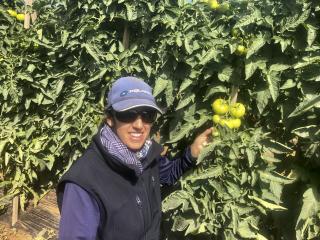Western Australia
Septebmer 30, 2020

DPIRD development officer Annie van Blommestein is working with Carnarvon growers to help optimise tomato quality and productivity.
A scientific investigation to help optimise the quality of tomatoes grown in the Carnarvon Horticulture District has been initiated by the Department of Primary Industries and Regional Development.
Tomatoes account for about 30 per cent of the total horticultural production in the Gascoyne and are worth around $35 million per annum.
In recent years this winter season annual production has expanded to 12,000 tonnes of Round, Cherry, Grape and Roma tomatoes, destined predominately for the Perth domestic market.
Department development officer Annie van Blommestein will collaborate with industry stakeholders on the project, including seed company representatives, growers, packers, market agents and industry bodies.
“The investigation will examine all the links in the on farm production process and the supply chain to see where Carnarvon growers can refine their operations so they can satisfy the post-harvest quality requirements of market agents, retailers and more importantly the end customer, the consumer,” she said.
“I’ll be collecting product samples from about 30 participating growers at different points in the supply chain over the next few weeks for analysis.
“Local producers will be engaged via a number of formats throughout the project to share the findings and determine a best fit approach forward.”
The outcomes from the investigation will identify potential focus areas for demonstration trials on growers’ properties in 2021.
“The project is likely to examine production aspects of fertiliser strategies, irrigation practice and systems, as well as integrated pest and disease management to optimise yields and quality,” Mrs van Blommestein said.
“Post harvest outcomes resulting from current practices will also be reviewed and results extended to demonstrate the best practices to deliver a product that satisfies market requirements.”
Mrs van Blommestein said enhancing the quality and reliability of Carnarvon produce was important for the long term sustainability of the region and the community.
“Carnarvon is an important contributor to winter tomato supplies in WA and horticulture is an integral part in the fabric of the Gascoyne River community,” she said.
“By working together and sharing knowledge and experiences, the industry will be able to build productivity and profitability so it can continue to grow and thrive.”